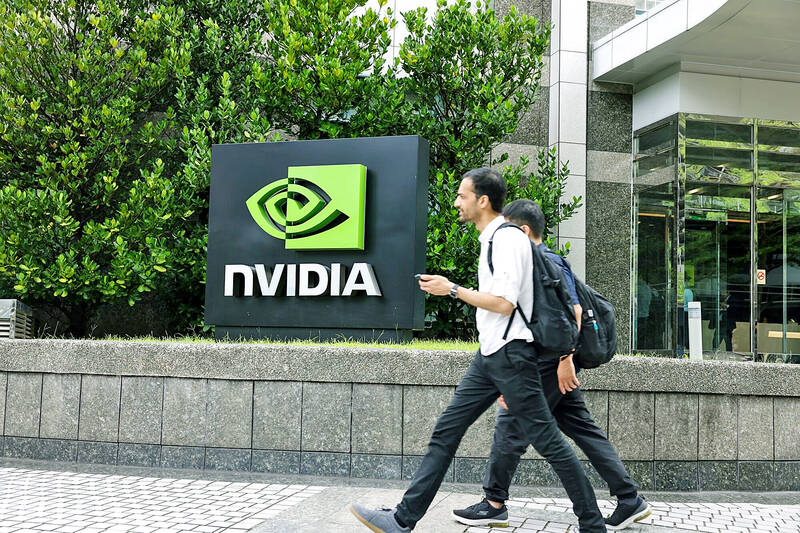Taiwan Semiconductor Manufacturing Co (TSMC, 台積電) shares yesterday rallied 2 percent on the local stock market after Nvidia Corp said the contract chipmaker would be the sole supplier of its latest graphics processing chip, defusing speculation that Intel Corp would get a share of the orders.
TSMC’s share price climbed to NT$562, snapping a three-day losing streak. It outperformed the benchmark index’s 1.18 percent gain. Net purchases by foreign institutional investors yesterday totaled 8.37 million shares, reversing net sales of 2.9 million shares on Thursday.
The rebound follows Nvidia’s announcement that its latest artificial intelligence graphics processing unit (GPU), codenamed H100, would be made using the Taiwanese firm’s 4-nanometer process technology, extending its partnership with the world’s biggest contract chipmaker.

Photo: Cheng I-hwa, Bloomberg
“Our next-generation [GPU] gonna be made at TSMC,” Nvidia founder and chief executive offer Jensen Huang (黃仁勳) told reporters on Thursday in Taipei after appearing on the stage with server maker Super Micro Computer Inc’s chief executive Charles Liang (梁見後) at Computex Taipei.
“We are diversifying through multiple nodes and multiple fabs at TSMC. We are also going to diversify in the US at TSMC. So TSMC is now part of Nvidia’s diversity and redundancy strategy,” Huang said. “It will take some time to target designs for the US fab.”
TSMC’s new US fab in Arizona is to commence mass production of 4-nanometer chips by the end of next year.
The Hsinchu-based chipmaker is planning a second fab in the US to make 3-nanometer chips. Together, the two fabs would have an installed capacity of 600,000 12-inch wafers, it said.
Huang said TSMC is a company with “immense capacity” and “incredible agility.”
Besides, TSMC is running its local fabs at a high yield rate and delivers very good costs, Huang said.
The demand for Nvidia’s H100 AI GPU processor “is extremely high,” he added.
Huang dismissed a media report that Nvidia could make its H100 GPU processor at Intel. TSMC is also the supplier of Nvidia’s previous generations of GPU, including the A100 and A800 series, using TSMC’s 7-nanometer process technology.
“That’s not true,” Huang said. “TSMC’s process technology is, as you know, world class.”
Huang on Wednesday said Nvidia adopted a diversity and redundancy strategy to safeguard the resilience of its supply chain.
The company also works with Samsung Electronics Co and is open to cooperating with Intel on manufacturing, he said.

Taiwan Semiconductor Manufacturing Co (TSMC, 台積電) would not produce its most advanced technologies in the US next year, Minister of Economic Affairs J.W. Kuo (郭智輝) said yesterday. Kuo made the comment during an appearance at the legislature, hours after the chipmaker announced that it would invest an additional US$100 billion to expand its manufacturing operations in the US. Asked by Taiwan People’s Party Legislator-at-large Chang Chi-kai (張啟楷) if TSMC would allow its most advanced technologies, the yet-to-be-released 2-nanometer and 1.6-nanometer processes, to go to the US in the near term, Kuo denied it. TSMC recently opened its first US factory, which produces 4-nanometer

PROTECTION: The investigation, which takes aim at exporters such as Canada, Germany and Brazil, came days after Trump unveiled tariff hikes on steel and aluminum products US President Donald Trump on Saturday ordered a probe into potential tariffs on lumber imports — a move threatening to stoke trade tensions — while also pushing for a domestic supply boost. Trump signed an executive order instructing US Secretary of Commerce Howard Lutnick to begin an investigation “to determine the effects on the national security of imports of timber, lumber and their derivative products.” The study might result in new tariffs being imposed, which would pile on top of existing levies. The investigation takes aim at exporters like Canada, Germany and Brazil, with White House officials earlier accusing these economies of

GREAT SUCCESS: Republican Senator Todd Young expressed surprise at Trump’s comments and said he expects the administration to keep the program running US lawmakers who helped secure billions of dollars in subsidies for domestic semiconductor manufacturing rejected US President Donald Trump’s call to revoke the 2022 CHIPS and Science Act, signaling that any repeal effort in the US Congress would fall short. US Senate Minority Leader Chuck Schumer, who negotiated the law, on Wednesday said that Trump’s demand would fail, while a top Republican proponent, US Senator Todd Young, expressed surprise at the president’s comments and said he expects the administration to keep the program running. The CHIPS Act is “essential for America leading the world in tech, leading the world in AI [artificial

REACTIONS: While most analysts were positive about TSMC’s investment, one said the US expansion could disrupt the company’s supply-demand balance Taiwan Semiconductor Manufacturing Co’s (TSMC, 台積電) new US$100 billion investment in the US would exert a positive effect on the chipmaker’s revenue in the medium term on the back of booming artificial intelligence (AI) chip demand from US chip designers, an International Data Corp (IDC) analyst said yesterday. “This is good for TSMC in terms of business expansion, as its major clients for advanced chips are US chip designers,” IDC senior semiconductor research manager Galen Zeng (曾冠瑋) said by telephone yesterday. “Besides, those US companies all consider supply chain resilience a business imperative,” Zeng said. That meant local supply would